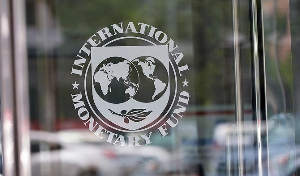 The International Monetary Fund (IMF)
The International Monetary Fund (IMF)
Madagascar has unlocked access to additional $658 million loans from the International Monetary Fund (IMF) executive board following fund support approval under the Extended Credit Facility (ECF) in the amount of US$337 million.
This comes in addition to a Resilience and Sustainability Facility (RSF) arrangement in the amount of US$321 million.
In a statement, the multilateral lender said the ECF and RSF-supported programs are aligned with the authorities’ objectives highlighted in the new General State Policy (PGE) adopted in early 2024 and aim to increase Madagascar’s economic resilience and foster long-term inclusive growth.
The RSF arrangement will underpin reforms to strengthen adaptation to climate change and resilience against natural disasters, support climate change mitigation efforts, enhance the protection of ecosystems, and create conditions for green private sector investment
This bring total credit support for the country to $658 million. Furthermore, the Executive Board took note of Madagascar’s cancellation of the 40-month arrangement under the ECF which had been approved on March 29, 2021.
Madagascar’s growth eased to 3.8 percent in 2023, while inflation pressures have waned. Weak revenue mobilization and JIRAMA’s losses have continued to weigh on the fiscal balance.
The current account deficit narrowed, owing primarily to a decline in imports and reflecting the slowdown in economic activity.
The authorities are committed to stabilize debt below 60 percent of GDP and bring the primary deficit to around 3 percent of GDP during the program. They intend to undertake revenue measures and to reduce transfers to the energy sector, including by a progressive phasing-out of fuel subsidies.
These efforts should help create fiscal space for investment in human and physical capital. The authorities are also committed to strengthening governance, transparency, and the fight against corruption, continuing the implementation of the interest rate targeting operational monetary policy framework, and building resilience, especially through stronger social safety nets.
Medium-term growth prospects appear favorable, bolstered by the reforms supported by the RSF and the ECF, including government programs aimed at boosting agricultural productivity, increasing access to electricity, and improving road infrastructure. Risks to the outlook are tilted to the downside, amid an uncertain global environment. Madagascar also remains vulnerable to climate shocks.
Speaking at the conclusion of the Executive Board discussion, Ms. Antoinette Sayeh, Deputy Managing Director, and Acting Chair said, “Madagascar continues to face challenges, with economic growth easing in a context of weak fiscal performance and gradual reform progress. Going forward, climate change poses significant risks to Madagascar’s economy.
“The new arrangements under the Extended Credit Facility (ECF) and the Resilience and Sustainability Facility (RSF) will support the authorities’ program focused on strengthening human capital, accelerating economic development, and improving governance."
“The authorities are implementing measures to create fiscal space for much needed social spending and investment. These include medium-term revenue mobilization efforts through tax policy and revenue administration measures."
“The implementation of an automatic fuel pricing mechanism and the preparation of a recovery plan for JIRAMA should enable to gradually reduce government transfers to the energy sector. These efforts should allow to stabilize public debt below 60 percent of GDP in the medium-term."
“The authorities are preparing a new anti-corruption strategy, which, together with a Governance Diagnostic Assessment by the IMF, will support further efforts to fight corruption, promote transparency and improve governance."
“They are also working on the implementation of a new monetary policy operational framework, focusing on strengthening liquidity management and the central bank’s communication”.